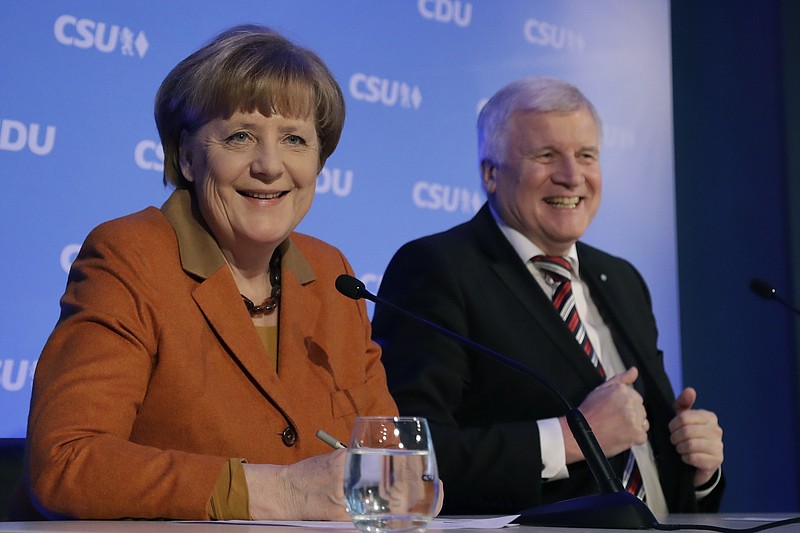WARSAW, Poland (AP) - German Chancellor Angela Merkel visits Warsaw on Tuesday for talks with Poland's top leaders, taking efforts to save the European Union to a country that is keen to keep as much national power as possible and fears being marginalized in a "two-speed Europe."
Her trip is "one of the most important visits in Polish-German relations since 2004," when Poland joined the EU, said Sebastian Plociennik, an expert at the Polish Institute of International Affairs.
The 28-nation bloc is struggling for a way forward after Britain's vote to leave.
"The decisions made this year will set the path for the EU's future," Plociennik said.
Poland's populist ruling party, Law and Justice, is often described as euroskeptic, but unlike right-wing populists in France and elsewhere, it does not advocate leaving the EU.
EU membership remains hugely popular in Poland, whose citizens have benefited enormously from development funds and the freedom to work elsewhere in the bloc.
However, Law and Justice fears that Poland's national identity has been eroded by liberal Western values and it also has made it a mission to preserve as much power for Europe's national parliaments as possible. Many criticize what they see as the EU's distant and inefficient bureaucracy. Poland is also not eager to join the 19-nation eurozone anytime soon.
Law and Justice chairman Jaroslaw Kaczynski also maintains that the EU has become a vehicle for Germany to dominate smaller states.
"I am not saying that we have no advantages," he said in an interview with the German daily Frankfurter Allgemeine Zeitung published on the eve of the visit. "But Germany has more. Ms. Merkel is absolutely the No. 1 in the EU, and that is not a healthy situation."
"European legislation must be reduced to its core: the common market, to some extent environmental protection," he told FAZ. "But no one can tell us how to regulate marriage or how we stand on sexual orientation. Also, there is a tendency in the Union toward radical restriction of freedom of speech and belief."
Despite Kaczynski's criticism, he still made clear that he endorses Merkel in Germany's September elections, saying that her main opponent, Martin Schulz, has "inclination toward Russia" and describing him as "a left-wing ideologue."
Polish officials are also concerned that the EU could react to Britain's decision to leave by developing a more deeply integrated core made of up Germany, France and the Benelux nations, which could then dictate financial rules to other EU countries.
Those fears of becoming marginalized have flared as Merkel speaks of a "multi-speed" Europe.
But Poland has also marginalized itself under its current government by taking an obstructionist position on climate change, refusing to accept Muslim refugees and refusing to give up its heavy reliance on coal. It is also in a standoff with Brussels for eroding the independence of Poland's constitutional court.
Merkel is to meet with Prime Minister Beata Szydlo, President Andrzej Duda and Kaczynski, as well as opposition leaders and representatives of the ethnic German minority in Poland.
Duda's foreign policy adviser, Krzysztof Szczerski, said Germany had requested "a strict one-on-one with the president," even without an interpreter.
The re-election of Donald Tusk, the former Polish prime minister, as head of the European Council, is likely to come up in the talks. Tusk had Merkel's backing for his first term and hopes to serve another term when his ends in May.
Kaczynski, a rival of Tusk, has indicated he won't support Tusk for another EU term.
"It's a paradox of our time that German has to ask a Pole to keep another Pole in an important EU role," said Ryszard Petru, head of the opposition Modern party.
____
Geir Moulson in Berlin and Monika Scislowska in Warsaw contributed to this report.
